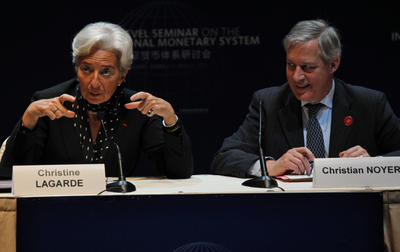Four out of the five countries that abstained on a UN vote authorising military strikes to enforce the no-fly zone in Libya are the members of BRIC (Brazil, Russia, India and China), and also members of the G20. Other countries, including Germany and Indonesia, also disagreed over the sanctions. In contrast, France, who holds this year’s G20 presidency, was the main supporter of military strikes in Libya, along with the US and the UK. Given this, a political division overshadows this year’s G20 Summit (3–4 November 2011) in Cannes.
How should the G20 contain these political divisions, then? First, the G20 Finance Ministers’ and Central Governors’ Meeting (‘FMCGM’) must reach a strong consensus and commitment on the economic fronts so that the focus and agenda during the Leaders’ Summit will not be lost.
This year’s FMCGM put a new agenda on the table: controlling excessive commodity and energy (including oil, gas and coal) price volatility, food security and long-term investment in the agricultural sector in developing countries. This agenda is critical, partly due to climatic shocks that appear to be making certain commodity prices more volatile (some blame speculation on the commodity derivative markets, too much demand growth and a lack of transparency in emerging markets as well).
All this is accidently timely as the political crises in the Middle East and the unprecedented earthquake, tsunami and nuclear crisis in Japan pose risks to global energy security. This new agenda aligns with the Seoul Development Consensus on Shared Growth and Multi-Year Action Plan, since food crises affect the poorest first and most. The urgency of this agenda leaves no space for political tension.
Second, in the midst of unstable and uneven global economic recovery, reform momentum should be maintained, including international financial institution reform, rebalancing global imbalance, and structural reforms. The indicative guidelines, agreed upon at the FMCGM 2011, to assess persistently large imbalances were a positive step, and the IMF-facilitated Mutual Assessment Process will monitor the consistency of national policies.
On 11 March 2011, the IMF also boosted its funding resources ten-fold via the New Arrangement to Borrow, which is a set of credit arrangements between the IMF and 26 old plus 13 new members (among the 13 new participants was BRICS, with China’s credit arrangement taking the third largest position after the US and Japan). The IMF quota reforms increased the voting shares of dynamic emerging markets and developing countries by over six percentage points (placing China as the third largest shareholder and BRICS among the top ten).
Additionally, the IMF overhauled its lending and conditionality framework, including the new Flexible Credit Line and High Access Precautionary Arrangement, to help with global liquidity issues. The new financial reforms have also been formulated by the Financial Stability Board and the Basel Committee (Basel III), but are yet to be fully implemented. The next financial reform agenda includes the completion of the global-systematically important financial institution reforms. And while all these reforms were just put in place, or are yet to be put in place, the G20 leaders need to show full commitment to them.
Third, the G20 must avoid a politically-sensitive agendas such as governance reforms of the UN Security Council or the inclusion of democracy and human rights issues. This could divert focus away from reforming the global economic system and restoring global economic recovery, undermining the main work of the group.
The G20 was formed in the midst of economic crises (the FMCGM in 1997, the Leaders’ Summit in 2008), and it should remain committed to avoiding any possible risk of another crisis. What triggered the political crises in the Middle East were citizens’ discontents over a cocktail of dismal socio-economic conditions — persistent poverty, rising food prices and high unemployment to name a few. So, if the leaders’ political commitment is to restore peace and stability, tidying up the economy is the pre-condition; and if the G20 fails to restore or bring momentum to the global economic recovery, then it will exacerbate political instability globally.
The rise of the BRICS strikes a balance between emerging countries and the hegemony of the G7. Certainly, ‘caucusing’ among developing countries is not to be discouraged as a way of finding common thinking and cooperation. At the same time, a structural ‘caucus’ among G20 economies would be an unwelcome development. For the G20 to work, flexibility and openness between all its members, whether from the BRICS or the rest, is of paramount importance.
Maria Monica Wihardja is a researcher at the Centre for Strategic and International Studies, Indonesia, and is a lecturer at the Department of Economics, University of Indonesia. A version of this article published here in The Jakarta Post.

